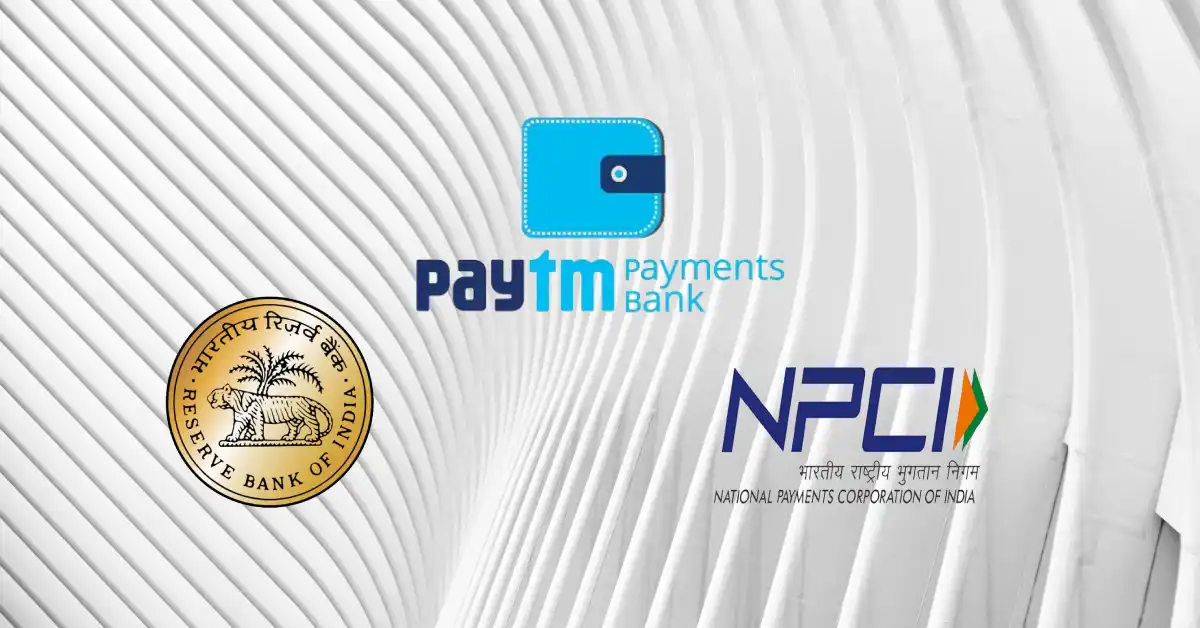Table of Contents
- RBI’s Nod for Paytm as P2P Platform?
- Paytm Payments Bank Restrictions and New Banking Partners
- Paytm’s Future: Growth Beyond Payments Bank Restrictions?
- Frequently Asked Questions(FAQs):
- Is Paytm still operational?
- Can I still do peer-to-peer (P2P) payments using Paytm?
- What are the alternative banking partnerships for Paytm?
- What is the future of Paytm with its payments bank limitations?
- How will the NPCI decision on Paytm’s platform proposal impact me?
- What is the impact of the RBI’s restrictions on Paytm Payments Bank?
- How will Paytm’s potential P2P platform status affect users?
Fintech giant Paytm might be getting some good news as the Reserve Bank of India (RBI) nudges National Payments Corporation of India (NPCI) to consider its proposal for becoming a platform for peer-to-peer (P2P) payments . This move signals a potential shift in the RBI’s stance and offers Paytm a lifeline amidst recent regulatory restrictions.
RBI’s Nod for Paytm as P2P Platform?
The RBI has reportedly recommended NPCI to evaluate Paytm’s parent company, One97 Communications Ltd.’s , request to operate as a platform facilitating transactions from other banks. This would enable users to continue using the Paytm app for P2P transactions seamlessly.
Some related articles
Paytm Payments Bank Restrictions and New Banking Partners
Previously, Paytm primarily relied on Paytm Payments Bank Ltd. to handle most transactions, including those processed through NPCI’s network. However, recent RBI restrictions prevent Paytm Bank (not directly owned by One97) from onboarding new payments after March 15, 2024. This has prompted Paytm to explore alternative banking partnerships for managing its payments and financial services.
RBI’s Earlier Action on Paytm Payments Bank
In January 2024, the RBI prohibited Paytm Bank from accepting new deposits in customer accounts and mobile wallets, impacting its core operations. The bank, categorized as a payments bank (can accept deposits but not lend), was granted a limited timeframe to wind down operations.
NPCI’s UPI: A Key Player in Digital Payments
NPCI’s Unified Payments Interface (UPI) is a state-backed innovation enabling instant money transfers by connecting banks with fintech apps like Paytm, PhonePe, and Google Pay. This system has revolutionized digital payments for millions of Indians, especially those without access to credit cards. In January alone, UPI processed transactions exceeding ₹18.41 trillion ($222 billion).
RBI Ensures Continuity of UPI Services for Paytm Users
Last week, the RBI instructed NPCI to ensure uninterrupted access to UPI services for Paytm app users. Additionally, the central bank suggested NPCI allow 4-5 banks to facilitate UPI transactions on the Paytm platform.
RBI’s Measures: Customer and System Protection Focus
The RBI clarifies that these actions are solely intended to safeguard customers and the payment system from potential disruptions.
Paytm Partners with Axis Bank for Payment Processing
In a separate development, Paytm has partnered with Axis Bank Ltd. to replace Paytm Payments Bank as the primary entity for its merchant payment settlement operations.
Make Your finances better with our Personal Finance Software
Paytm’s Future: Growth Beyond Payments Bank Restrictions?
While the Paytm Payments Bank faces disruptions, the RBI’s recent directives suggest potential avenues for Paytm to continue expanding its fintech services and product offerings beyond the limitations of its payments bank.
Frequently Asked Questions(FAQs):
Is Paytm still operational?
Yes, Paytm is still operational and users can continue to access essential services like UPI payments, bill payments, and recharges. However, its payments bank operations are restricted and cannot accept new deposits or payments after March 15, 2024.
Can I still do peer-to-peer (P2P) payments using Paytm?
Potentially. While Paytm’s own payments bank is restricted, RBI’s recent suggestion to NPCI regarding Paytm’s platform proposal offers hope for continued P2P functionality through the Paytm app
What are the alternative banking partnerships for Paytm?
Paytm has partnered with Axis Bank to handle merchant payment settlements in place of its own payments bank. This ensures continued service for merchants accepting payments through Paytm.
What is the future of Paytm with its payments bank limitations?
Paytm’s future looks promising despite the payments bank restrictions. The RBI’s willingness to consider Paytm as a platform for P2P transactions and the new partnership with Axis Bank suggest possibilities for continued growth in its fintech services and product offerings.
How will the NPCI decision on Paytm’s platform proposal impact me?
If the NPCI approves Paytm’s proposal, users might experience minimal disruption and continue using the Paytm app seamlessly for P2P transactions. However, the final decision by NPCI is still pending. Stay tuned for further updates.
What is the impact of the RBI’s restrictions on Paytm Payments Bank?
The RBI’s restrictions, prohibiting new deposits and onboarding new customers, limit Paytm Payments Bank’s ability to function as Paytm’s primary payment processing entity. This has forced Paytm to seek alternative banking partnerships and explore other avenues for offering financial services.
How will Paytm’s potential P2P platform status affect users?
If Paytm’s proposal for a P2P platform is approved, users might be able to continue using the Paytm app for seamless peer-to-peer transactions. This could involve collaborating with other banks to facilitate these transactions through the UPI network.

